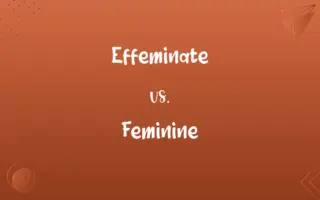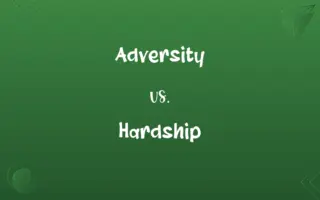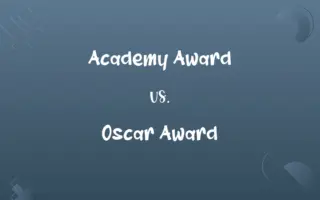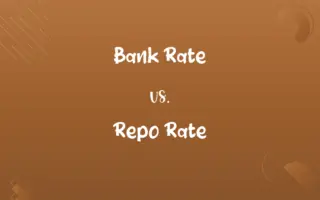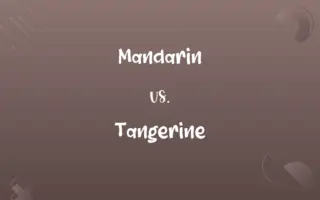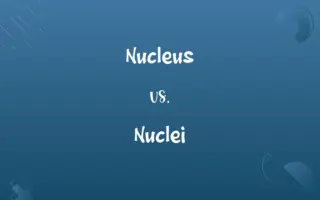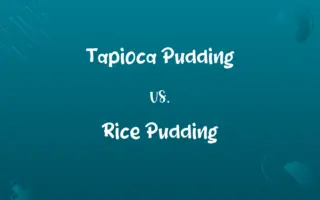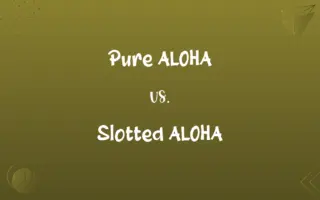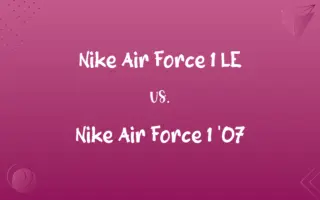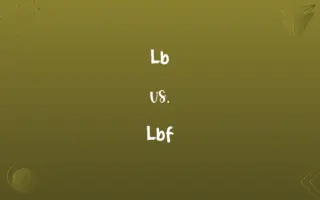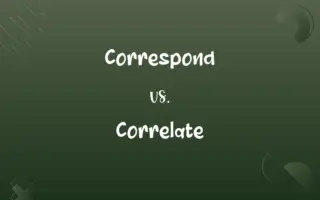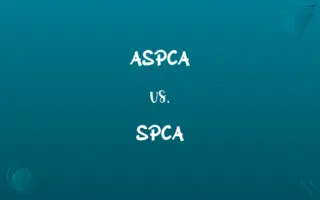Paradox vs. Oxymoron: Know the Difference

By Shumaila Saeed || Updated on December 25, 2023
A paradox is a statement that contradicts itself but reveals a deeper truth, while an oxymoron combines two contradictory terms for effect.
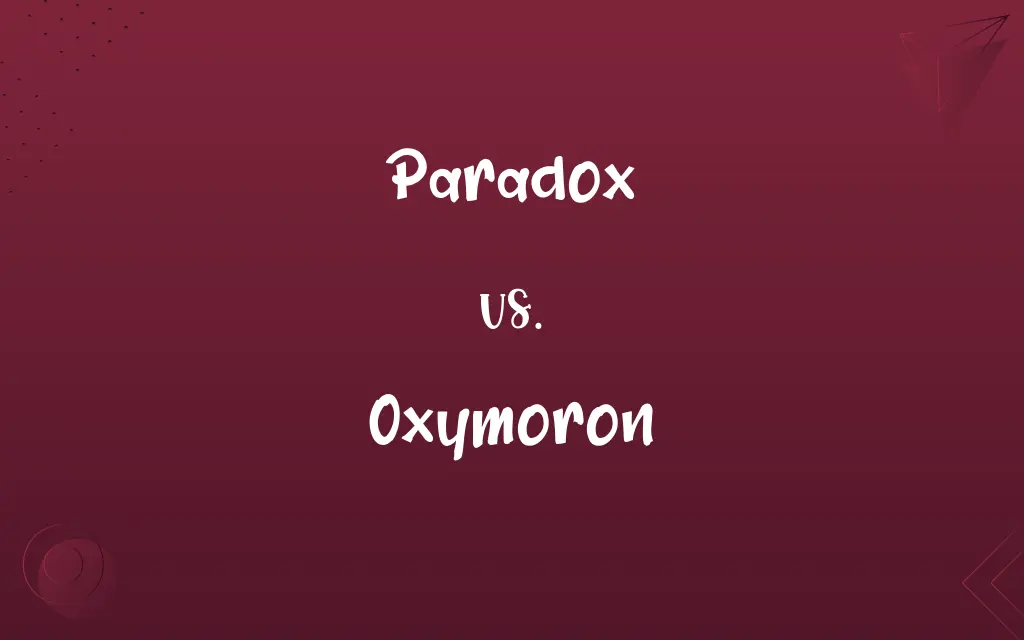
Key Differences
A paradox is a seemingly self-contradictory statement that, upon reflection, may reveal a deeper truth. In contrast, an oxymoron is a figure of speech that combines two opposing or contradictory terms.
Shumaila Saeed
Nov 28, 2023
Paradoxes are often used in literature and philosophy to stimulate thought and highlight complex truths. Oxymorons, on the other hand, are used in language for dramatic, comedic, or rhetorical effect.
Shumaila Saeed
Nov 28, 2023
The beauty of a paradox lies in its ability to challenge conventional wisdom and provoke new insights. Conversely, an oxymoron often creates a striking or amusing juxtaposition, enhancing the expressiveness of language.
Shumaila Saeed
Nov 28, 2023
While paradoxes can encompass entire sentences or longer passages, oxymorons are typically concise, combining just two words. This brevity in oxymorons contrasts with the potentially expansive nature of paradoxes.
Shumaila Saeed
Nov 28, 2023
Paradoxes invite deeper analysis to uncover underlying truths, often leading to philosophical or existential discussions. Oxymorons, however, usually offer immediate, surface-level contradictions that emphasize rhetorical flair.
Shumaila Saeed
Nov 28, 2023
ADVERTISEMENT
Comparison Chart
Definition
A statement that contradicts itself but may reveal a hidden truth.
A combination of contradictory terms.
Shumaila Saeed
Nov 28, 2023
Usage
Used to provoke thought and highlight complex truths.
Used for rhetorical effect or emphasis.
Shumaila Saeed
Nov 28, 2023
Purpose
To challenge perceptions and stimulate deeper understanding.
To create striking or humorous juxtapositions.
Shumaila Saeed
Nov 28, 2023
Literary Context
Common in philosophy and literature.
Common in poetry and everyday speech.
Shumaila Saeed
Nov 28, 2023
ADVERTISEMENT
Paradox and Oxymoron Definitions
Paradox
A paradox is a statement that contradicts itself yet might be true.
This statement is false.
Shumaila Saeed
Nov 23, 2023
Oxymoron
An oxymoron is a concise way to express a contradiction.
Clearly confused.
Shumaila Saeed
Nov 23, 2023
Paradox
A paradox can be a situation that combines contradictory features.
The sound of silence.
Shumaila Saeed
Nov 23, 2023
Oxymoron
An oxymoron is a paradoxical juxtaposition of words that seem incongruent.
Living death.
Shumaila Saeed
Nov 23, 2023
Paradox
A paradox is a logically self-contradictory statement or proposition.
I always lie.
Shumaila Saeed
Nov 23, 2023
ADVERTISEMENT
Oxymoron
An oxymoron is a figure of speech that combines contradictory terms.
Bittersweet experience.
Shumaila Saeed
Nov 23, 2023
Paradox
A paradox is a statement that defies intuition or common sense but may be true.
Less is more.
Shumaila Saeed
Nov 23, 2023
Oxymoron
An oxymoron is a rhetorical device that juxtaposes opposing words for effect.
Deafening silence.
Shumaila Saeed
Nov 23, 2023
Paradox
A statement that seems to contradict itself but may nonetheless be true
The paradox that standing is more tiring than walking.
Shumaila Saeed
Oct 19, 2023
Oxymoron
A rhetorical figure in which incongruous or contradictory terms are combined, as in a deafening silence and a mournful optimist.
Shumaila Saeed
Oct 19, 2023
Paradox
A person, thing, or situation that exhibits inexplicable or contradictory aspects
"The silence of midnight, to speak truly, though apparently a paradox, rung in my ears" (Mary Shelley).
Shumaila Saeed
Oct 19, 2023
Oxymoron
(rhetoric) A figure of speech in which two words or phrases with opposing meanings are used together intentionally for effect.
Shumaila Saeed
Oct 19, 2023
Paradox
A statement that is self-contradictory or logically untenable, though based on a valid deduction from acceptable premises.
Shumaila Saeed
Oct 19, 2023
Paradox
An apparently self-contradictory statement, which can only be true if it is false, and vice versa.
"This sentence is false" is a paradox.
Shumaila Saeed
Oct 19, 2023
Oxymoron
A figure in which an epithet of a contrary signification is added to a word; e. g., cruel kindness; laborious idleness.
Shumaila Saeed
Oct 19, 2023
Paradox
A counterintuitive conclusion or outcome.
It is an interesting paradox that drinking a lot of water can often make you feel thirsty.
Shumaila Saeed
Oct 19, 2023
Paradox
A claim that two apparently contradictory ideas are true.
Not having a fashion is a fashion; that's a paradox.
Shumaila Saeed
Oct 19, 2023
Oxymoron
An oxymoron is used for dramatic, comedic, or rhetorical emphasis.
Seriously funny.
Shumaila Saeed
Nov 23, 2023
Paradox
A thing involving contradictory yet interrelated elements that exist simultaneously and persist over time.
Shumaila Saeed
Oct 19, 2023
Paradox
A person or thing having contradictory properties.
He is a paradox; you would not expect him in that political party.
Shumaila Saeed
Oct 19, 2023
Paradox
An unanswerable question or difficult puzzle, particularly one which leads to a deeper truth.
Shumaila Saeed
Oct 19, 2023
Paradox
(obsolete) A statement which is difficult to believe, or which goes against general belief.
Shumaila Saeed
Oct 19, 2023
Paradox
(uncountable) The use of counterintuitive or contradictory statements (paradoxes) in speech or writing.
Shumaila Saeed
Oct 19, 2023
Paradox
The practice of giving instructions that are opposed to the therapist's actual intent, with the intention that the client will disobey or be unable to obey.
Shumaila Saeed
Oct 19, 2023
Paradox
A tenet or proposition contrary to received opinion; an assertion or sentiment seemingly contradictory, or opposed to common sense; that which in appearance or terms is absurd, but yet may be true in fact.
A gloss there is to color that paradox, and make it appear in show not to be altogether unreasonable.
This was sometime a paradox, but now the time gives it proof.
Shumaila Saeed
Oct 19, 2023
Paradox
(logic) a self-contradiction;
`I always lie' is a paradox because if it is true it must be false
Shumaila Saeed
Oct 19, 2023
Paradox
A paradox is a rhetorical device used to illustrate a logical inconsistency.
I am nobody.
Shumaila Saeed
Nov 23, 2023
Repeatedly Asked Queries
How are paradoxes used in literature?
To challenge thinking and explore complex ideas.
Shumaila Saeed
Nov 28, 2023
Can a paradox be true?
Yes, paradoxes often reveal a deeper truth despite their contradictions.
Shumaila Saeed
Nov 28, 2023
What is a paradox?
A statement that contradicts itself but may contain a truth.
Shumaila Saeed
Nov 28, 2023
Are oxymorons always two words?
Typically, but they can be slightly longer phrases.
Shumaila Saeed
Nov 28, 2023
How do paradoxes affect readers?
They provoke thought and may lead to new insights.
Shumaila Saeed
Nov 28, 2023
Do oxymorons make logical sense?
Not literally, but they make sense in a rhetorical or poetic context.
Shumaila Saeed
Nov 28, 2023
Where are oxymorons most frequently found?
In poetry, advertising, and everyday speech.
Shumaila Saeed
Nov 28, 2023
What effect do oxymorons have in writing?
They add emphasis, humor, or dramatic effect.
Shumaila Saeed
Nov 28, 2023
Do paradoxes have practical applications?
Yes, in areas like mathematics and philosophy.
Shumaila Saeed
Nov 28, 2023
Can a paradox be resolved?
Sometimes, but they often remain open to interpretation.
Shumaila Saeed
Nov 28, 2023
What is the purpose of an oxymoron?
To create a striking or humorous effect.
Shumaila Saeed
Nov 28, 2023
Are paradoxes common in everyday language?
Not as common as in philosophical or literary contexts.
Shumaila Saeed
Nov 28, 2023
Why are oxymorons used in poetry?
For their evocative and expressive qualities.
Shumaila Saeed
Nov 28, 2023
Can an oxymoron be a single word?
Rarely, but some words have oxymoronic qualities.
Shumaila Saeed
Nov 28, 2023
Do paradoxes have a single interpretation?
Often they are open to multiple interpretations.
Shumaila Saeed
Nov 28, 2023
Can a paradox be a physical situation?
Yes, if it involves contradictory elements.
Shumaila Saeed
Nov 28, 2023
Is a paradox always intentional?
Usually, but some arise naturally in language or situations.
Shumaila Saeed
Nov 28, 2023
Share this page
Link for your blog / website
HTML
Link to share via messenger
About Author
Written by
Shumaila SaeedShumaila Saeed, an expert content creator with 6 years of experience, specializes in distilling complex topics into easily digestible comparisons, shining a light on the nuances that both inform and educate readers with clarity and accuracy.
